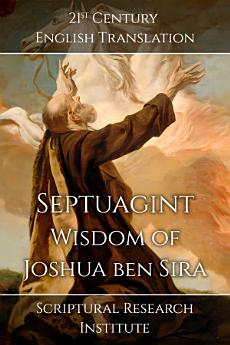Septuagint: Wisdom of Joshua ben Sira
Пра гэту электронную кнігу
Hebrew and Aramaic fragments of the Wisdom of Joshua ben Sira were in circulation during the Herodian Dynasty, and fragments have survived among the Dead Sea Scrolls, including the 2QSir, 11QPsa, and MasSir scrolls, however, the fragments may not have been part of a book called the Wisdom of Joshua Ben Sira. The 2QSir and MasSir scrolls are so damaged that they are barely recognizable as being excerpts from Joshua ben Sira, and the 11QPsa scroll, while being one of the best-preserved scrolls found in the Qumran caves, includes random psalms and proverbs from multiple sources, including excerpts from Joshua ben Sira. As the Wisdom of Joshua ben Sira was itself a collection of proverbs that Joshua had collected, it is possible that these scrolls may have simply drawn on the same sources.
Some elements of the hedonistic version of Judaism remain in the Wisdom of Joshua ben Sira, including the reference to Iaw reacquiring Israel as his portion when the Highest God divided the nations of humanity between the princes. This is a reference to the 70 or 72 Elohim who were placed over the 70 or 72 nations of humans, in the early Second Temple era hedonistic form of Judaism. This was first mentioned in the Song of Moses, in Deuteronomy chapter 32, and then again in the Talmud which mentions the story of Dobiel, the 'prince of Persia' who was once the proxy for Gabriel in heaven for 21 days after Gabriel angered God by allowing the Jews to leave Babylon, when God wanted the Babylonians to kill them. While be was Gabriel's proxy Dobiel allowed the Persians to conquer the known world, which was the explanation of the sudden rise of the Persian Empire in the early Second Temple era. Dobiel was again referred to as the 'Prince of Persia' in the Revelation of Metatron, which listed Samael as the 'Prince of Rome.'











